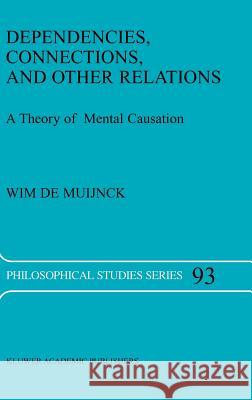Dependencies, Connections, and Other Relations: A Theory of Mental Causation » książka
Dependencies, Connections, and Other Relations: A Theory of Mental Causation
ISBN-13: 9781402013911 / Angielski / Twarda / 2003 / 288 str.
Dependencies, Connections, and Other Relations: A Theory of Mental Causation
ISBN-13: 9781402013911 / Angielski / Twarda / 2003 / 288 str.
(netto: 576,41 VAT: 5%)
Najniższa cena z 30 dni: 578,30
ok. 22 dni roboczych
Bez gwarancji dostawy przed świętami
Darmowa dostawa!
The text before you is a study ofthe problematic issue ofmental causation: causation by minds. On hearing the expression 'mental causation, ' you may at first think ofsomething like bending spoons by 'psychic' powers. But no, we are dealing here with something much more puzzling: doing things for reasons, i. e., what we call agency. Psychic spoon-bending would be a fairly straightforward issue. You just exert some psychic force and bend a spoon, just like you might bend it by hand, i. e., by physical force. The only trouble here is that psychic forces may not be in fact available '. But now you fetch an umbrella because you expect that it will rain. How does that work? Some- how, it seems, you let an expectation move your limbs. But aren't your limbs already moved by nerve impulses and muscle contractions? And are expecta- tions the proper kind ofitems to move things around? Mental causation is an issue that is at the heart ofthe mind-body problem, the problem of making it clear how minded creatures such as we are possi- ble, and what our mindedness consists in. Unlike psychic spoon-bending, mental causation happens every day. At least, pretty much of what we take for granted about ourselves can only be right when mental causation really happens.











